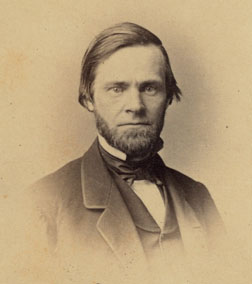| John Sherman  Born: 10-May-1823 Born: 10-May-1823
Birthplace: Lancaster, OH
Died: 22-Oct-1900
Location of death: Washington, DC
Cause of death: unspecified
Remains: Buried, Mansfield Cemetery, Mansfield, OH
Gender: Male
Race or Ethnicity: White
Sexual orientation: Straight
Occupation: Politician
Party Affiliation: Republican [1] Nationality: United States
Executive summary: Sherman Antitrust Act The American financier and statesman John Sherman, a younger brother of General William T. Sherman, was born at Lancaster, Ohio, on the 10th of May 1823. He began the study of law at Mansfield, Ohio, and was admitted to the bar in 1844. For ten years he practiced his profession with success, and with only casual interest in politics. His associations and predilections were with the Whigs, and he was a delegate to the National Convention that nominated General Zachary Taylor in 1848. Upon the repeal of the Missouri Compromise by the Kansas-Nebraska Bill in 1854, he joined the great popular movement in Ohio against the policy represented by this bill, and was elected to Congress in the autumn of that year as an "Anti-Nebraska" man.
In the summer of the next year he took an active part in the formal organization of the Republican party in the state, and at the opening of Congress in December began a long career of public service. As a member of the House (1855-1861), he quickly manifested the qualities which characterized his whole political life. Though a thorough and avowed partisan, he was within the party the counselor of moderate rather than extreme measures, and thus gained on the whole a position of great influence. He was a member of the committee sent by the House in 1856 to investigate the troubles in Kansas, and drafted the report of the majority. In 1859 he was the Republican candidate for Speaker of the House, but was obliged, after a contest that lasted two months, to withdraw, largely because of the recommendation he had inadvertently given to an anti-slavery book, The Impending Crisis of the South (1857), by Hinton Rowan Helper (1829-1909). He became, however, chairman of the Committee on Ways and Means, and was instrumental in the enactment of the Morrill Tariff Act of 1860.
In March 1861 he took his seat in the Senate, to which he had been elected to succeed Salmon P. Chase, when the latter became Secretary of the Treasury. As Senator he sat continuously until he became Secretary of the Treasury in 1877. His interest and efficiency in financial legislation in the House led to his appointment on the Senate Committee of Finance, and after 1867 he was chairman of this influential committee. He thus became associated with the enactment of all the great fiscal laws through which the strain of war and of reconstruction was sustained. He gave earnest support to the Legal Tender Act, and the substitution of the national for the state banking system.
When after the end of the war the question of financial readjustment came up, he vigorously opposed Secretary Hugh McCulloch's policy of retiring the legal tenders, and urged a different plan for effecting the resumption of specie payments. On the questions relating to political reconstruction and the policy of President Andrew Johnson, he supported his party, though opposed to its Radical leaders. He warmly advocated the insertion in the Reconstruction Acts of a provision ensuring the early termination of military government; and he opposed the impeachment of President Johnson, though he voted for conviction on the trial. During the administrations of President Ulysses S. Grant his leadership in shaping financial policy became generally recognized. The Resumption Act of 1875, which provided for the return of specie payments four years later, was largely his work both in inception and in formulation, and his appointment to the head of the Treasury Department by President Rutherford B. Hayes in 1877 enabled him to carry the policy embodied in the law to successful execution. His administration of the department, in circumstances of great difficulty arising out of the "greenback" agitation and the adverse political complexion of Congress, won him high distinction as a financier.
At the end of the Hayes administration he was again elected to the Senate from Ohio and held his seat until 1897. During this period he was largely concerned in the enactment of the Anti-Trust Law of 1890, and of the so-called Sherman Act of the same year, providing for the purchase of silver and the issuing of Treasury notes based upon it. This latter Act he approved only as a means of escaping the free coinage of silver, and he supported its repeal in 1893. In 1880 and 1888 he aspired actively to the Republican nomination for the presidency, but failed to obtain the requisite support in the Convention. During the last years of his senatorial career he was chairman of the Senate Committee on Foreign Affairs. Upon the accession of President William McKinley in 1897, he resigned from the Senate and became Secretary of State; but under the tension of the war with Spain the duties of the office became too exacting for his strength at his age, and in April 1898 he resigned and withdrew into private life. Infirmities multiplied upon him, until his death at Washington on the 22nd of October 1900.
[1] Whig, then Republican.
Father: Charles R. Sherman (judge, d. 1829)
Brother: William T. Sherman (Union General, b. 1820, d. 1891)
US Secretary of State (6-Mar-1897 to 27-Apr-1898 for William McKinley)
US Senator, Ohio (1881-97)
US Secretary of the Treasury (10-Mar-1877 to 3-Mar-1881 for Rutherford B. Hayes)
US Senator, Ohio (1861-77)
US Congressman, Ohio 13th (1855-61)
Author of books:
Recollections of Forty Years in the House, Senate and Cabinet: An Autobiography (1895, memoir)
Requires Flash 7+ and Javascript.
Do you know something we don't?
Submit a correction or make a comment about this profile
Copyright ©2019 Soylent Communications
|